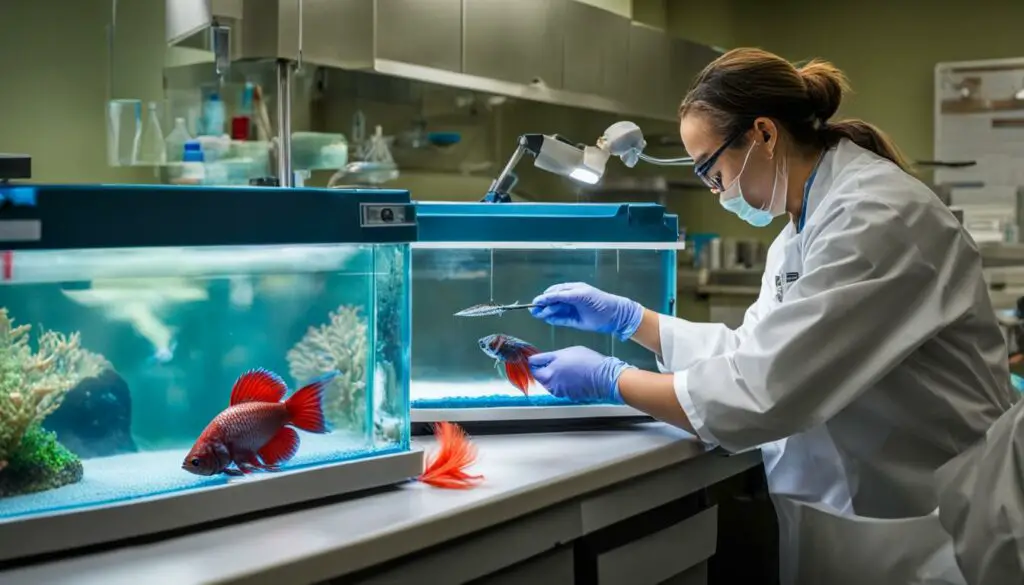Last Updated on 4 months by admin
If you’re a proud owner of a betta fish, it’s essential to know how to treat betta fish tumors. Tumors in betta fish can be benign or malignant and can significantly impact the health and well-being of your pet.
However, there are several treatment options available that can help in reducing the size or slowing down the growth of betta fish tumors. In this guide, we will discuss different methods of treating betta fish tumors, including natural remedies, medications, and surgical options.
Key Takeaways:
- Betta fish tumors can significantly impact the health and well-being of your pet.
- There are different methods of treating betta fish tumors, including natural remedies, medications, and surgical options.
- Consulting a veterinarian who specializes in aquatic animals is recommended for betta fish tumor removal.
- Prevention is always better than cure, and proper care and long-term betta fish care can help prevent tumors from developing.
- Regular monitoring and follow-up care are necessary after initiating treatment for betta fish tumors.
Understanding Betta Fish Tumors
If you are a betta fish owner, it’s essential to be aware of common health issues that can affect your pet. Betta fish tumors are one such concern that can impact the overall health and well-being of your fish.
A tumor is an abnormal growth of cells within the body. In the case of betta fish, tumors can occur in various locations, such as the head, tail, and body. These growths can be benign or malignant, with malignant tumors being more severe and potentially life-threatening to the fish.
There are several symptoms that betta fish owners should be aware of when it comes to tumors. These include:
- A visible lump or growth on the body of the fish
- Changes in swimming behavior
- Difficulty eating or breathing
- Lethargy or lack of energy
If you notice any of these symptoms, it’s vital to seek veterinary care promptly. Delaying treatment could lead to more severe health complications for your betta fish.
Several factors can contribute to the development of betta fish tumors. These include:
- Poor water quality: Betta fish require a specific water temperature, pH levels, and adequate filtration to thrive. Exposure to unsuitable water conditions for prolonged periods can weaken their immune system, making them more susceptible to tumors and other health issues.
- Genetics: Some breeds of betta fish are more prone to tumors due to their genetic makeup.
- Aging: As with humans, as betta fish age, their immune system weakens, making them more susceptible to tumors and other health issues.
As a responsible betta fish owner, it’s crucial to take steps to prevent health issues and promote overall wellness. This includes providing a suitable living environment, monitoring water quality regularly, and seeking veterinary care promptly when symptoms arise.
Next, we will explore the options for seeking veterinary care for betta fish tumors and the potential benefits of doing so.
Seeking Professional Veterinary Care
Dealing with betta fish tumors can be overwhelming, especially if you’re unsure about the best course of treatment. While natural remedies and medication can be effective, it’s always a good idea to seek professional veterinary care when your betta fish is unwell. A qualified veterinarian who specializes in aquatic animals can provide guidance on the best ways to care for your betta fish, including removing tumors safely and effectively.
When it comes to selecting a betta fish veterinarian, there are a few important factors to consider. Look for a professional who has experience in treating betta fish and who you feel comfortable communicating with openly and honestly. You might ask other betta fish owners for recommendations or search online for reviews of local veterinary clinics.
During your initial consultation, your veterinarian will perform a thorough examination of your betta fish to assess the extent of the tumor and identify any underlying health problems that may be contributing to the growth. They may also recommend diagnostic tests or imaging studies to gather more information about the tumor.
If surgery is necessary, your veterinarian will explain the procedure and potential risks involved. They may also provide instructions on post-operative care, which may include monitoring for signs of infection, keeping your betta fish in a clean and stress-free environment, and providing appropriate medication and nutrition.
In addition to providing expert care for your betta fish, a veterinarian can offer valuable tips and advice on general betta fish care, including water quality management, feeding, and disease prevention. By partnering with a qualified betta fish veterinarian, you can help ensure the health and happiness of your pet fish for years to come.

Betta Fish Care Tips:
- Regularly monitor your betta fish’s water quality to ensure a healthy and clean aquatic environment.
- Feed your betta fish a balanced and nutrient-rich diet to support their overall health and immune function.
- Provide appropriate tank size and accessories to ensure your betta fish has adequate space and stimulation.
- Be vigilant for signs of illness or abnormal behavior, and seek professional veterinary care promptly if you have concerns about your betta fish’s health.
By following these simple care tips and partnering with a knowledgeable betta fish veterinarian, you can help ensure a long and happy life for your beloved pet fish.
Natural Remedies for Betta Fish Tumors
While consulting with a veterinarian and using medication or surgery may be necessary in certain cases, some betta fish owners prefer natural remedies for treating tumors. It’s important to note that natural remedies may not always be 100% effective, and it’s important to monitor your fish’s progress closely.
Garlic Treatment
Garlic has been known to have anti-cancer properties and can be used as a natural remedy for betta fish tumors. Crush a small piece of garlic clove and soak it in a small amount of tank water for a few hours. Remove the garlic and add the water to your betta fish’s tank. Repeat this process every two to three days for up to two weeks.
Tea Tree Oil Treatment
Tea tree oil has antifungal and antibacterial properties, which could help reduce the size or slow the growth of betta fish tumors. Mix a few drops of tea tree oil with a small amount of tank water and add it to your betta fish’s tank. Repeat this process every two to three days for up to two weeks. Be cautious not to use too much tea tree oil, as it could harm your fish if used excessively.
| Remedy | Instructions |
|---|---|
| Garlic Treatment | Crush a small piece of garlic clove and soak it in a small amount of tank water for a few hours. Remove the garlic and add the water to your betta fish’s tank. Repeat this process every two to three days for up to two weeks. |
| Tea Tree Oil Treatment | Mix a few drops of tea tree oil with a small amount of tank water and add it to your betta fish’s tank. Repeat this process every two to three days for up to two weeks. Be cautious not to use too much tea tree oil, as it could harm your fish if used excessively. |
These natural remedies are intended to reduce the size or slow the growth of betta fish tumors. It’s important to use them with caution and monitor your fish’s behavior and health closely. If you notice any adverse reactions or no improvement in your fish’s condition, stop using the natural remedies and seek veterinary care.

Medications for Betta Fish Tumors
When natural remedies and veterinary care are not enough to treat betta fish tumors, medications may be necessary. Different types of medications are available for treating various betta fish diseases and tumors.
One common medication used for treating tumors in betta fish is Kanamycin, which is an antibiotic with powerful anti-inflammatory effects. It helps in reducing the size of tumors and prevents the spread of infection. Another medication, Maracyn, is also an effective treatment option. It is an antibiotic that works by killing the bacteria responsible for the tumor formation.
It is important to note that medications should only be used under the guidance and prescription of a qualified veterinarian. Overuse or misuse of medications can lead to adverse side effects or even harm your betta fish. It is also crucial to follow the dosage and administration instructions carefully to ensure the safety and effectiveness of the medication.

Some potential side effects of medication include discoloration of the water, loss of appetite, and lethargy. If any of these symptoms occur, immediately stop the medication and seek guidance from your veterinarian.
It’s important to remember that medications are not always the best option for treating betta fish tumors, and natural remedies or surgery may be more suitable. Always consult with your vet to determine the best course of action for your pet fish.
Surgical Options for Betta Fish Tumors
When natural remedies or medications aren’t effective in treating betta fish tumors, surgical intervention may be necessary. The decision to opt for surgery should be made in consultation with a veterinarian experienced in aquatic animal surgery.
The surgical options for betta fish tumors include:
| Procedure | Description | Risks |
|---|---|---|
| Tumor excision | A surgical procedure where the tumor is removed under anesthesia | Risk of death under anesthesia, bleeding, and infection |
| Curretage | Scraping the tumor off the body using a sharp spoon-shaped instrument under anesthesia | Risk of incomplete removal, bleeding, and infection |
It’s important to note that surgery can be stressful for betta fish, and proper postoperative care is crucial for their recovery.
After surgery, it’s essential to maintain a clean and healthy environment to prevent infection and promote healing. Follow the veterinarian’s instructions regarding feeding, medication, and monitoring of the wound.

Remember to handle your betta fish with care and gentleness, and don’t hesitate to seek professional guidance when needed.
Prevention and Long-Term Betta Fish Care:
Preventative measures are crucial to ensuring the overall well-being of your betta fish. Here are some betta fish care tips to promote long-term health:
- Provide a suitable and clean environment: Maintain an appropriate aquarium size and keep the water clean and properly filtered. Betta fish also require a heater to maintain a consistent temperature between 75 and 80 degrees Fahrenheit.
- Feed a balanced diet: Offer a variety of high-quality betta fish food, including pellets, flakes, and frozen or live foods. Avoid overfeeding, as it can lead to obesity and other health issues.
- Monitor for potential health issues: Keep an eye on your betta fish for any unusual behavior or symptoms of illness, such as lethargy or loss of appetite. Catching and treating health issues early can prevent further complications.
- Provide stimulation and enrichment: Betta fish are intelligent and curious creatures that require mental stimulation and enrichment. Offer toys, plants, and hiding places to keep your fish happy and healthy.
By implementing these care tips, you can reduce the risk of betta fish tumors and other health issues.
In addition to preventative measures, regular check-ups and water quality management are essential for long-term betta fish care. A water test kit can help you maintain optimal water conditions and prevent the growth of harmful bacteria. It’s also important to change the water regularly and remove any uneaten food or waste to prevent contamination of the aquarium.
Remember, betta fish care is an ongoing process that requires attention and dedication. By following these tips, you can ensure a happy and healthy life for your beloved pet fish.

Monitoring and Follow-Up Care
Once you have initiated the treatment for your betta fish tumor, it’s essential to monitor the progress carefully. It will help determine if the treatment is effective or if adjustments are necessary.
A significant aspect of betta fish health is maintaining water quality. Ensure to test the water regularly and keep the temperature between 76°F and 82°F. It’s essential to keep the water clean and change it regularly to reduce the risk of infection and other related issues.
Observe your fish and look for any changes in behavior or appetite. Any changes could be a sign of something more serious, and prompt action may be necessary.
Post-Surgery Care for Betta Fish Tumor Removal
If your betta fish has undergone surgery to remove a tumor, special care is required after the procedure. Ensure that the water parameters are ideal for post-surgery recovery. In addition, you may need to adjust the fish’s diet, as well as limit the amount of light it is exposed to daily. These measures will help reduce stress on the fish and promote faster healing.
Closely Monitor other Fish in the Tank
It’s important to note that some betta fish tumors are contagious and may spread to other fish in the tank. Therefore, it’s crucial to monitor other fish in the tank and look out for any signs of lumps or growths. Isolate any fish you suspect may have a tumor and seek veterinary help promptly if necessary.

In conclusion, monitoring and follow-up care are essential components of betta fish health. Regular check-ups, water quality management, and observing your fish’s behavior are crucial for the long-term well-being of your pet fish. Remember to provide appropriate post-surgery care if your fish has undergone a tumor removal procedure. With careful monitoring and timely action, you can ensure a healthy and happy life for your beloved betta fish.
Conclusion
Proper betta fish tumor care is crucial for the health and well-being of your fish. By understanding betta fish tumors and the treatment methods available, you can provide the best possible care for your pet. Regular veterinary check-ups, monitoring, and follow-up care are essential to keep your betta fish healthy. Remember to maintain proper water quality, provide a healthy diet, and create a stress-free environment for your fish.
While treating betta fish tumors can be challenging, the reward of a healthy and happy fish is worth it. By utilizing natural remedies, medications, or surgical procedures, and taking preventative measures, you can help reduce the risk of tumors and promote the overall health of your betta fish. Always consult a qualified veterinarian and seek professional advice before administering any treatments.
Thank you for reading this guide on how to treat betta fish tumors and for taking the necessary steps to provide the best possible care for your pet. With proper care and attention, your betta fish can live a long and happy life.
FAQ
What are betta fish tumors?
Betta fish tumors are abnormal growths that can occur in various parts of a betta fish’s body. These growths can be benign or malignant and may affect the overall health of the fish.
What are the common symptoms of betta fish tumors?
Common symptoms of betta fish tumors include unusual growths or lumps on the fish’s body, changes in behavior, loss of appetite, difficulty swimming, and discoloration.
What causes betta fish tumors?
The exact cause of betta fish tumors is not fully understood, but factors such as genetics, poor water quality, and environmental stressors can contribute to their development.
Should I seek veterinary care for my betta fish’s tumor?
It is recommended to consult a veterinarian who specializes in aquatic animals for proper diagnosis and guidance on the treatment of betta fish tumors. They can provide expert advice and perform necessary procedures if needed.
Are there natural remedies for betta fish tumors?
Yes, there are some natural remedies that can help in reducing the size or slowing down the growth of betta fish tumors. These include maintaining clean water conditions, providing a balanced diet, and using herbal treatments known for their potential benefits.
Can medications be used to treat betta fish tumors?
In certain cases, medications may be necessary to treat betta fish tumors. There are different types of medications commonly used, and it is crucial to follow proper dosage and administration guidelines for the safety and well-being of your fish.
Are there surgical options for removing betta fish tumors?
Yes, surgical options may be available for removing certain types of betta fish tumors. However, surgery should only be considered after consulting with a qualified veterinarian, as it carries certain risks and considerations.
How can I prevent betta fish tumors?
To prevent betta fish tumors, it is essential to provide proper care and maintain a healthy environment. This includes regular water changes, maintaining optimal water parameters, providing a balanced diet, and minimizing stressors such as overcrowding.
What should I do after initiating treatment for betta fish tumors?
After initiating treatment for betta fish tumors, it is important to monitor the progress of the fish and provide necessary follow-up care. This includes regular check-ups with a veterinarian, maintaining good water quality, and ensuring a stress-free environment.
Can treating betta fish tumors improve their quality of life?
Yes, by following the methods outlined in this guide and providing proper care, treatment, and monitoring, you can improve the quality of life for your betta fish and potentially reduce the impact of tumors on their overall health and well-being.

